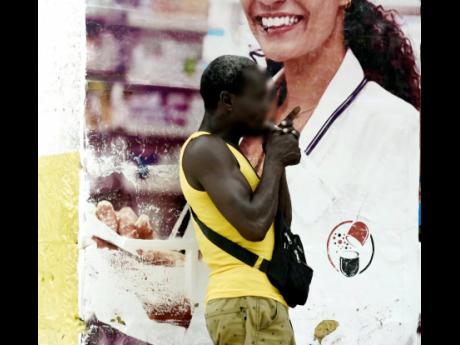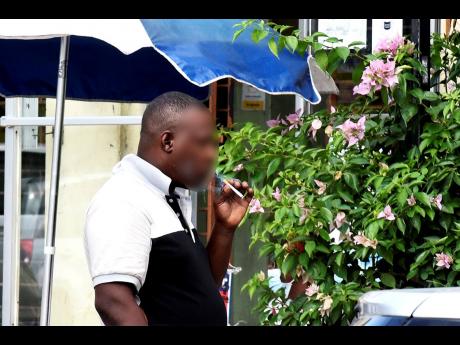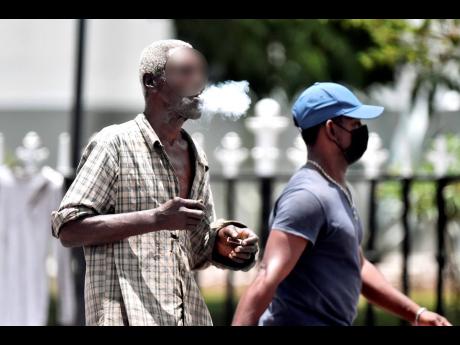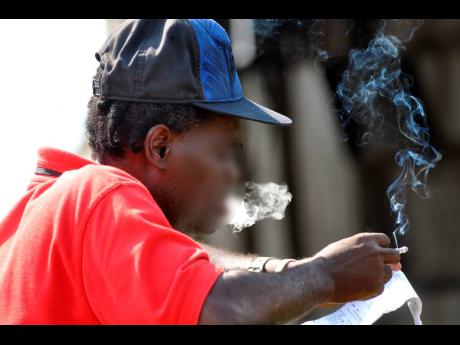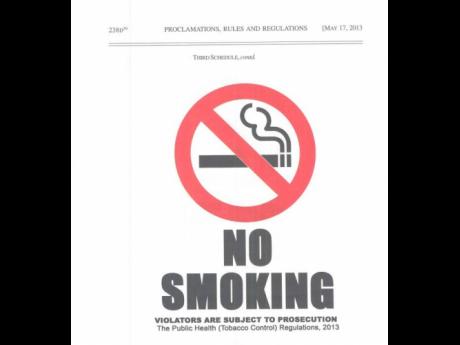BAN UP IN SMOKE?
J’cans still lighting up in public spaces with impunity
With many smokers freely lighting up cigarettes and puffing away in public spaces and limited enforcement by the police, the fire against the practice has seemingly gone out nearly a decade after new public health laws were introduced. A multi-...
With many smokers freely lighting up cigarettes and puffing away in public spaces and limited enforcement by the police, the fire against the practice has seemingly gone out nearly a decade after new public health laws were introduced.
A multi-parish Sunday Gleaner probe revealed that many smokers continue to flout the regulations without fear of prosecution.
Several violators of the Public Health (Tobacco Control) Regulations 2013 and the Dangerous Drugs Act, which was amended in 2015, were observed in Kingston, St Ann, Portland, Manchester, Trelawny and Westmoreland.
Section 12 of the Public Health (Tobacco Control) Regulations under the Public Health Act says there should be no smoking in a public place. It states: “Every person who smokes or holds a lit or electronic tobacco product in or within a five-metre radius of the entrance, exit, window or ventilation intake of a public place, workplace or public conveyance, including but not limited to any place listed in the second schedule, commits an offence.”
Meanwhile, Section 7E of the amendments to the Dangerous Drugs Act also says “smoking of ganja in public places (is) prohibited”.
According to the amendments, “a person who smokes ganja in or within a five-metre radius of the entrance, exit or window or ventilation intake of a public place, workplace or public conveyance, including but not limited to any place listed in paragraph three contravenes this schedule”.
Last week, Health and Wellness Minister Dr Christopher Tufton readily admitted that more needs to be done to prosecute offenders.
“It is true that enforcement is not as rigid as it should be for several reasons, I think, including [a] limited number of public health officers and perhaps the need for better coordination with the police. There is also, I think, a need for more public education,” Tufton noted in a written response to The Sunday Gleaner.
“Having said that, I still think the law is observed in a number of establishments. The challenge, normally, are special, planned events such as entertainment events and informal gatherings. The enforcement for these would require more personnel and coordination with the police.”
Tufton noted that Parliament will soon debate a comprehensive tobacco legislation, which is now going through its final stages of a joint select committee.
“I think [this legislation] will bring more urgency to the need for better enforcement. There will also be a public education campaign after the bill is passed,” he said.
In the meantime, attorney-at-law Bert Samuels said the lack of enforcement could be a result of the high number of other more serious offences and crimes for which the police force has to dedicate a lot of resources towards.
“I think where the problem lies is that it is not being policed in any serious way. The police are forced to prioritise serious crimes on the streets and smoking – whether tobacco or marijuana – is a low-priority policing activity, and may be rightly so because we are already short of police officers,” said Samuels.
He added: “My personal observation is that there is a total insensitivity by ganja smokers about causing others to become third-party users of marijuana, which is grossly inconsiderate. Smoking where you feel like is wrong. It should be a private activity done with respect for others.”
NO TICKET BOOKS
Court records have showed that people are in fact being brought to book for flouting the law, but there appears to be a fog of confusion that is impeding additional prosecutions.
A senior cop, who spoke on condition of anonymity, told The Sunday Gleaner that prosecutions for smoking in public are partly being hampered by a failure to provide the police with the resources needed to issue tickets to offenders.
“We don’t have any ticket books. If we don’t have a ticket book, we can’t issue a smoke-ban ticket,” the senior officer said.
In 2016, Senior Superintendent of Police Marlon Nesbeth, then head of the St James Police Division, told The Gleaner that the smoking ban was on the police’s radar, but said more resources, such as a ticket-book system, were needed to effectively enforce the laws.
On Friday, Nesbeth, who is now acting head of the Area One Police, said: “Up to now, we haven’t had that opportunity. We have been making some arrests in other places. There is a grey area, though, that we still need to overcome that obstacle, depending on interpretations of the legislation. But, as far as I know, this is something that is being attended to and we should soon see it remedied.”
Nesbeth explained that while a person should be charged for smoking a tobacco product in public under the tobacco control regulations, a similar breach involving ganja is an offence for persons can be ticketed.
Asked whether the police are actively prosecuting people for smoking in public, Senior Superintendent of Police Stephanie Lindsay, head of the police’s Corporate Communications Unit, was not able to provide a definitive response.
“I am not in a position to comment on it now because I need to consult with our legal department,” she said.
While pointing out that the enforcement of the smoking ban is a matter for the Ministry of National Security, Justice Minister Delroy Chuck said the issue of the ticketing books is a procedural matter that shouldn’t hinder prosecutions of offences involving tobacco-based products.
“Nothing is needed. All that is needed is for it to be enforced,” Chuck stressed.
Checks with the official court sheet used in the Criminal Division of the Kingston and St Andrew Parish Court on May 3, 2022 showed that a man was charged with smoking in a public place.
Another man appeared in the same court on April 28 this year for the same charge, along with other traffic offences, such as dangerous driving, not wearing a seat belt, and failure to comply with a traffic sign. The traffic offences were transferred to the traffic court.
Kadeish Fletcher, director of communication at the Court Administration Division, confirmed that the courts have heard public smoking matters.
Breaches of the Public Health (Tobacco Control) Regulations, 2013 attract fines from $10,000 up to $50,000 for individuals; while businesses, including clubs, bars, restaurants and tourist establishments, may be fined up to $1 million.
NO-SMOKING ZONES
• The very broad “public places” designation
• Workplaces or places of employment
• Public conveyances
• All government-owned or occupied buildings
• Health facilities, including pharmacies
• Sports, athletic and recreational facilities, for the use of the public
• Educational institutions
• Bus stops
• Areas specifically for use by children
The Dangerous Drugs Act lists the following places where “smoking of ganja in public places (is) prohibited”:
• All government-occupied offices
• Health facilities, including pharmacies
• Sports, athletic and other similar facilities, for the use of the public educational institutions
• Bus stops and departure and arrival waiting areas at a port or station for any form of transportation
• Areas specifically for use by children
• Balconies of tourist establishments
• Residences and guest houses for the use of staff employed therein
• Beaches
• Outdoor dining and service areas
• Parks
• Any sites declared under the Jamaica National Heritage Trust Act to be a national heritage
• Class A and class B swimming pools operated under the Public Health (Swimming Pools) Regulations, 2000, or under the Public Health (Tourist Establishments) Regulations, 2000, (except pools for private use or where a pool is exclusively accessible for an independent or private villa or suite)
• Outdoor markets and other outdoor events or activities, being used for gathering by individuals
PENALTIES FOR BREACHING NO-SMOKING LAW
• In the case of a first offence, a fine of up to $10,000
• For a second offence, up to $25,000
• For subsequent offences, up to $50,000.
• Businesses, including clubs, bars, restaurants and tourist establishments may be fined up to $1 million.

